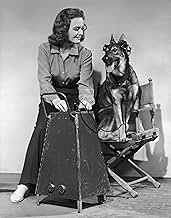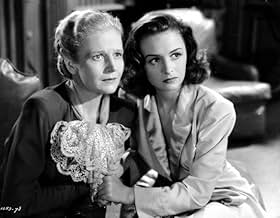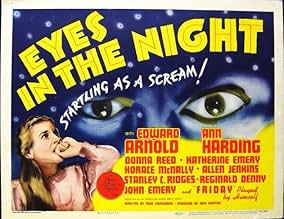IMDb RATING
6.7/10
2.1K
YOUR RATING
A blind detective and his seeing-eye dog investigate a murder and discover a Nazi plot.A blind detective and his seeing-eye dog investigate a murder and discover a Nazi plot.A blind detective and his seeing-eye dog investigate a murder and discover a Nazi plot.
Photos
Stephen McNally
- Gabriel Hoffman
- (as Horace McNally)
Stanley Ridges
- Hansen
- (as Stanley C. Ridges)
Rosemary DeCamp
- Vera Hoffman
- (as Rosemary de Camp)
Steven Geray
- Anderson
- (as Steve Geray)
John Butler
- Taxicab Driver
- (uncredited)
Edward Kilroy
- Pilot
- (uncredited)
- Director
- Writers
- All cast & crew
- Production, box office & more at IMDbPro
Storyline
Did you know
- TriviaThe first film in what was meant to be to be a mystery franchise focused on blind detective Duncan Maclain who solved murders with the help of his seeing eye dog, Friday. When the second entry, The Hidden Eye (1945), failed to elicit sufficient interest, MGM ended the series.
- GoofsWhen the butler/enemy agent Hansen confronts Duncan MacLean loudly playing the organ in the middle of the night, Hansen ruffles his own hair to appear as if he has been sleeping and just awakened - clearly forgetting that MacLean cannot see his appearance.
- Crazy creditsFriday appears as himself.
- Alternate versionsThere is now a colorized version available. Highly recommended as much of the film is set in the dark which doesn't register well in the b&w original.
- ConnectionsFeatured in Personalities (1942)
Featured review
I'd never heard of this film, but discovered it bundled in with a lot of other 30s/40s B-movies in the "Mystery Classics" collection from Platinum Video. It's a surprisingly good film, really a near-great film that's hobbled a bit by it's middle act.
The first part of the film is really the only part that's a straight-forward detective romp, w/ a blind detective and his seeing-eye-dog and his hired muscle simpleton helping him sleuth out a fairly typical wrongfully-accused-murder plot. This part of the film is all golden, partially, I think, because the Detective's characters (All intended to be recurring characters in an ongoing film franchise that never quite got off the ground after this really good first chapter) feel like they have a past together, they feel like they know who they are, which is unusual for a potboiler of this era.
The second act resolves the murder a bit too quickly - in fact, it's never exactly resolved, the film merely abruptly changes focus from the detective et al to the murderers themselves discussing why they did it. This robs the film of most of it's dramatic strength, and essentially the middle act becomes little more than filler. It's entertaining enough filler - a sort of World War II version of "Wait Until Dark" - but it doesn't really advance the plot much.
The third act is the somewhat-rushed climax/resolution, though it features an unexpectedly cool shootout filmed in a very unusual style, and extended sequence with the detective's amazingly-well-trained dog. (Seriously, this dog is great! He could easily do his own taxes. He makes any other trained film dog - and really most trained film monkeys - look like idiots by comparison). On the whole, the film ends well, but it never fully recovers the momentum it lost by shifting focus in the middle, and as a result the final wrap up just comes across as slightly unsatisfying. It is, however, a more than satisfying introduction to what no doubt would have been a great detective series which, sadly, never really took off. I'm very surprised the concept was never revisited on TV or Radio, since the central character is endlessly entertaining.
One odd note: the ending feels a bit truncated, with some of the action happening off-camera. For instance, early on one of the bad guys is captured and held by the detective's men. Later on, we're shown the detective's men bound and gagged, the bad guy having evidently escaped. Later the bad guy reunites with his own people, but the transition is so abrupt that it feels like we're missing a scene or two. Also, there's a subplot in which the bad guys are hiding family information from one of their own people. This sets up what is obviously intended to be a major plot point, but, in the end absolutely nothing comes of it. Again, is this a missing scene, or simply bad writing? I can't tell.
Still and all, this is a near-classic film with a great character and some fantastic performances that unfortunately hobbles itself. Well worth a viewing, however.
The first part of the film is really the only part that's a straight-forward detective romp, w/ a blind detective and his seeing-eye-dog and his hired muscle simpleton helping him sleuth out a fairly typical wrongfully-accused-murder plot. This part of the film is all golden, partially, I think, because the Detective's characters (All intended to be recurring characters in an ongoing film franchise that never quite got off the ground after this really good first chapter) feel like they have a past together, they feel like they know who they are, which is unusual for a potboiler of this era.
The second act resolves the murder a bit too quickly - in fact, it's never exactly resolved, the film merely abruptly changes focus from the detective et al to the murderers themselves discussing why they did it. This robs the film of most of it's dramatic strength, and essentially the middle act becomes little more than filler. It's entertaining enough filler - a sort of World War II version of "Wait Until Dark" - but it doesn't really advance the plot much.
The third act is the somewhat-rushed climax/resolution, though it features an unexpectedly cool shootout filmed in a very unusual style, and extended sequence with the detective's amazingly-well-trained dog. (Seriously, this dog is great! He could easily do his own taxes. He makes any other trained film dog - and really most trained film monkeys - look like idiots by comparison). On the whole, the film ends well, but it never fully recovers the momentum it lost by shifting focus in the middle, and as a result the final wrap up just comes across as slightly unsatisfying. It is, however, a more than satisfying introduction to what no doubt would have been a great detective series which, sadly, never really took off. I'm very surprised the concept was never revisited on TV or Radio, since the central character is endlessly entertaining.
One odd note: the ending feels a bit truncated, with some of the action happening off-camera. For instance, early on one of the bad guys is captured and held by the detective's men. Later on, we're shown the detective's men bound and gagged, the bad guy having evidently escaped. Later the bad guy reunites with his own people, but the transition is so abrupt that it feels like we're missing a scene or two. Also, there's a subplot in which the bad guys are hiding family information from one of their own people. This sets up what is obviously intended to be a major plot point, but, in the end absolutely nothing comes of it. Again, is this a missing scene, or simply bad writing? I can't tell.
Still and all, this is a near-classic film with a great character and some fantastic performances that unfortunately hobbles itself. Well worth a viewing, however.
- mahatmarandy
- May 13, 2006
- Permalink
- How long is Eyes in the Night?Powered by Alexa
Details
Box office
- Budget
- $433,000 (estimated)
- Runtime1 hour 20 minutes
- Color
- Aspect ratio
- 1.37 : 1
Contribute to this page
Suggest an edit or add missing content

































